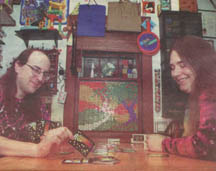 Smart
Game Winning a Cult
Smart
Game Winning a Cult Smart
Game Winning a Cult
Smart
Game Winning a CultFluxx, a card game that received a "best games of the year" honor bestowed by American Mensa, has latched onto the Internet to take a College Park couple's business up the ladder instead of down the chute.
Fluxx joins the ranks of other popular non-video games that have received the Mensa society's seal of approval, such as Trivial Pursuit, Scattergories and Taboo.
Fluxx, a game in which the rules change with every play, was introduced in 1997 by Looney Laboratories, run by Kristin and Andrew Looney. She's the marketing guru, and he's the creative mind.
An instant underground success in its simple black-and-white edition, last year Fluxx was republished in color by Iron Crown Enterprises under an exclusive licensing deal with Looney Labs.
The Looneys, who have longed to quit their day jobs and concentrate on their at home business, are on their way to realizing their dream.
Ten years ago, [correction: 5 years ago] Andrew developed Ice Breaker, a video game for the 3D[O] system that failed in its bid to win over Sega and Nintendo players.
About the same time [10 years ago] he came up with the idea for Ice House, a 60 piece game played with various sizes of pyramids put together from pre-cut cardboard patterns. The pyramids hold different values, and depending on whether they are standing up or pointing on their side, they are offensive or defensive pieces in the game that eventually spreads out on a playing surface.
The Looneys introduced their games at science fiction conventions, where they became hits among the cultists [???] who frequented the shows.
But Ice House was expensive to make, and they eventually shut it down. "We never made any money," Kristin said "We learned Ice House was an interesting game, but not very marketable. It's not a mainstream game. I wanted a card game because it was easier to manufacture."
That's when Fluxx was invented "It can be very chaotic, but it's also easy to play. You just reed the rules on the table," Kristin said.
The Looneys, former employees of NASA, left their jobs-he to work for the electronic video game company, she to help with the start-up of the IT unit of TSI Telsys. When his company folded, Andrew began concentrating on the invention of games.
The couple has no shortage of friends willing to help them iron out the glitches in their games. Once a week, beginning at 8 p.m. and going into the wee hours, about a dozen acquaintances descend on their home to play games.
The Looneys, both wearing tie-dyed shirts and barefoot, are reminiscent of the entrepreneurs of the sixties. Every nook and cranny in their home holds a memento from the period-such as the stuffed Beatles' dolls that hang above a window. And of course games of all kinds are stacked floor-to-ceiling next to the arcade-sized electronic video games. It's a place that kids' dreams are made of.
Kristin continued to go to her executive job, earning a lot of money to give the couple "expendable income they could throw away."
And that they did Every Christmas for the past 10 years, they manufactured some product They sold a few of each idea, but most were given out to friends for Christmas presents. The first printing of 5,000 black and white editions of Fluxx cost the couple $10,000.
"We had no venue. But when the Web showed up, we had avenue," said Kristin. "It gives me a store front. I can sell my leftover Christmas presents through the Web site."
That allowed her to give up her job in January, and devote herself full-time to marketing and filling orders from the Web site.
"It's very hard to market games. Games sell by word of mouth, and it takes time. It can take four years for a game to go anywhere," she said.
That's why the endorsement of Mensa, the high-IQ society, was important "We believe these games are the cream-of-the-crop and-like many of the past winners may become some of the best-selling games of the year," said Steve Weinreich, national chief judge, who presided over the societies 10th Annual Mind Games competition in Seattle in March.
Once a game takes off, the Looneys look for an outside firm to manufacture it. "If something gets bigger than our little family, we'll license it out I'll do that rather than have employees," Kristin said.
"Our goal is to not get a real job again," she said
"It looks like we'll be able to do it."